Introduction: Gena Philibert-Ortega is a genealogist and author of the book “From the Family Kitchen.” In this blog article, Gena gives examples of six types of newspaper articles that can help with your family history research.
Still looking for your ancestor in the newspaper? Or maybe you’re looking to find more mentions of your family? In yesterday’s Part I of our “12 Days of Christmas” blog article, we looked at six types of newspaper articles that give us some of the basic facts of a person’s life: birth, marriage, death, etc.
Now let’s look at six more types of newspaper articles that fill in more of the details of what your ancestors’ lives were like. All of these examples were found in the pages of GenealogyBank’s Historical Newspaper Archives.
I went to a family reunion last spring and that event was a great meeting between cousins who were new to each other – and an opportunity to trade photos and stories. Unfortunately, the local newspaper wasn’t there documenting that time we spent together, nor did anyone think of providing that story to them. However, it is not unusual to find family reunion activities documented in old newspapers. Large family reunions or milestone events that were the catalyst for a reunion (think of an elder family member’s birthday, 50th wedding anniversary, etc.) were newsworthy. Articles about these events in the local newspaper often include names, dates, history and memories.
For example, this Jackson family reunion article from a 1903 Texas newspaper tells the migration story of the family that ended in Dallas. The article gives the names, and the birth year and month, of each of the five Jackson family members pictured. It also gives a tremendous amount of family history, beginning with the family patriarch, John Jackson, his birth in England in 1806, and the perilous journey the family took in 1848 to come to Texas. Note that this article points out “His sons and daughters married, and had children, and these children did the same thing” – valuable clues to other records to search for in tracing this family’s history.
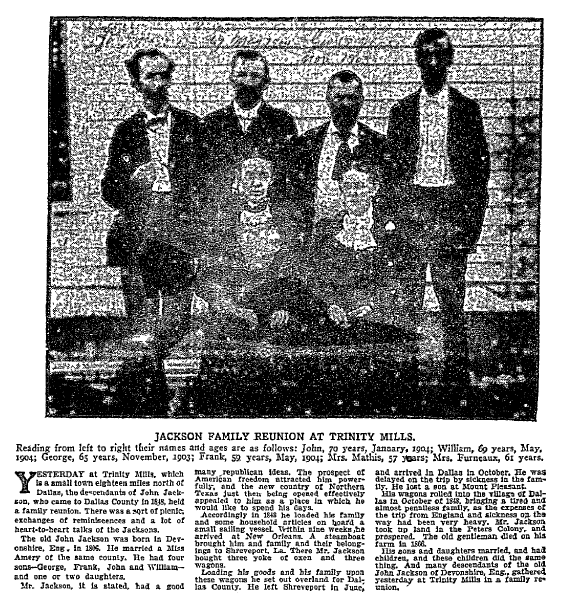
All types of newspaper articles document the school days of children and young adults. You might find articles about school sports competitions or awards won for various events. Lists of graduates are also popular newspaper fodder. As you consider school-based newspaper articles, remember to not make assumptions about your ancestor’s school career (such as presuming they never attended school), and don’t assume that their school days were like your own (that assumption can result in missing articles unique to their time period). Lastly, remember that newspaper articles may focus on students, teachers, staff, and the school board.
This 1897 New York newspaper article about the graduates of Miss Hunter’s Training School gives the names of women who graduated from this Kindergarten teacher training school. The graduates’ and post-graduates’ names and city of residence are listed.
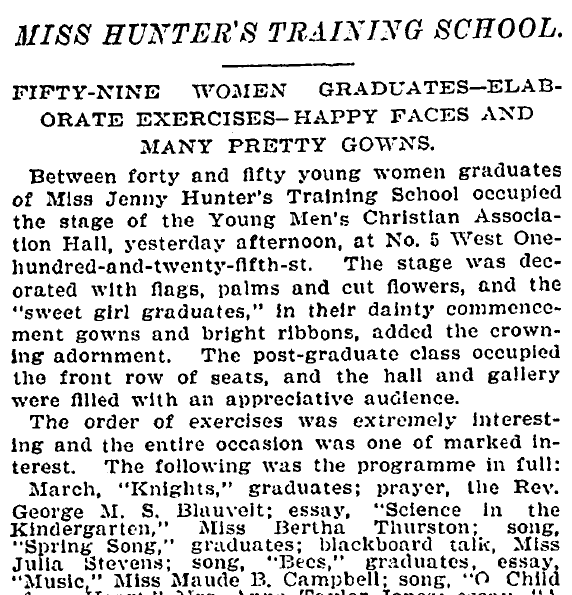
Obviously your ancestor’s name mentioned in a graduate list or attached to a school activity would be great to find – but don’t forget about photos in the newspaper. The GenealogyBank search engine provides you the ability to narrow your search results by photos and illustrations. By narrowing a search to the phrase “high school football” I found this great photo of the 1901 Baker City High School football team from Oregon. The caption reads “In the group here presented are the husky fellows who make up the Baker City High School football team, together with the coach and manager of the eleven and Professor Churchill, principal of the High School.” Surnames and positions played by the students are listed.
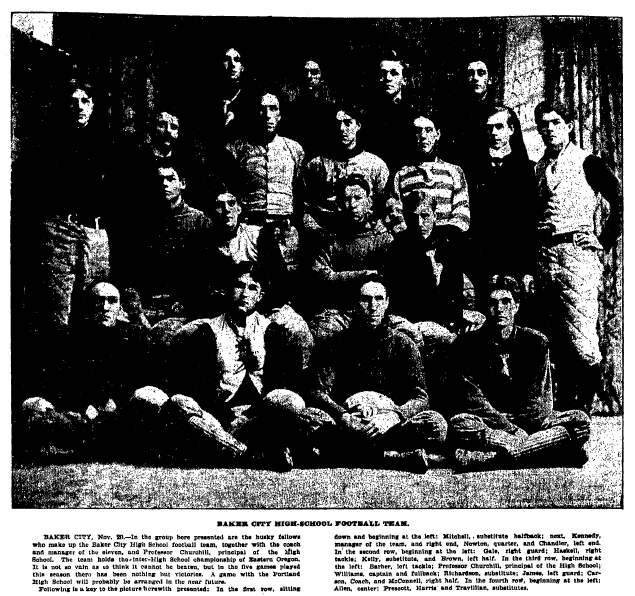
We’ve talked about legal notices before on this blog and how important they can be to your genealogy research. Those largely ignored, small dense notices in the back of the newspaper call to attention all kinds of important legal matters, including court actions. These notices, most useful for searching for your mid-19th century ancestors and beyond, are the place to find probate actions. If you’re having problems finding a probate in the courthouse archive where your ancestor lived, take a look at the legal notices in newspapers.
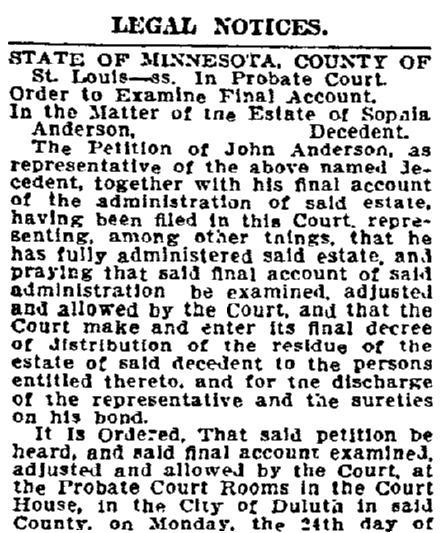
This is a list most of us would rather not find ourselves on. But just like modern families, our ancestors faced difficult economic times. Lists of those with delinquent taxes can be found in the newspaper and those mentions include a name, address and even the amount owed. Such articles should be followed up by searching land grants as well as additional newspaper articles having to do with the possible sale of the property for the money owed. A seemingly sudden move to a different address or completely out of an area might be explained by finding your ancestor’s name on such a list.
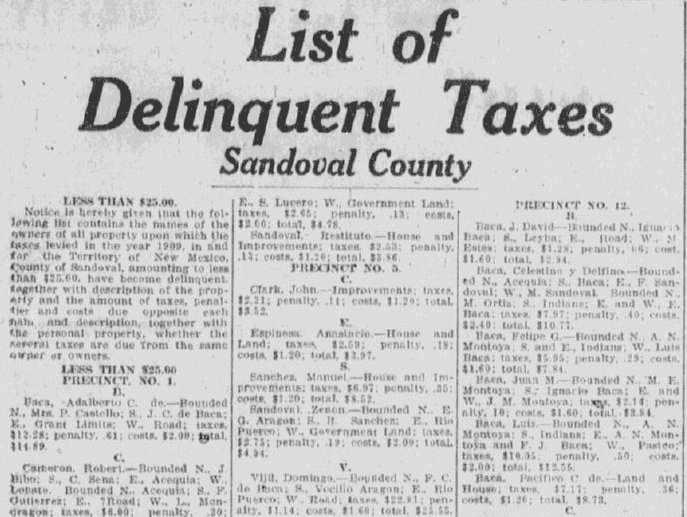
Did your ancestor have a strong opinion about something? Maybe they just wanted to inform the community about an issue or event. There were several ways a person could get their name in the newspaper and writing a letter to the editor was one.
Judging from the various letters to the editor columns I read, some newspapers allowed letter writers to use a symbolic moniker, some provided anonymity by printing only the writer’s initials, while others insisted on the full name and address of the individual. I love this 1915 letter to the editor article that explains to a person who signed their letter “Neutral” why their anonymous letter wasn’t published. As you can see by the editor’s explanation, those wishing to have a letter published had to include their name and address.
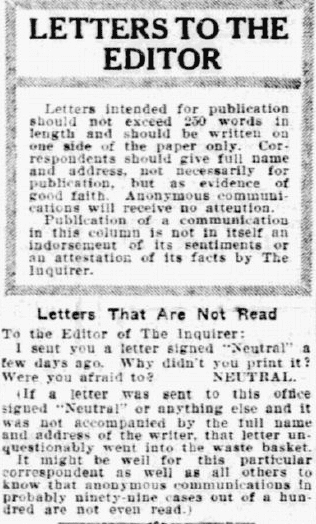
It’s important to remember to try various ways of searching for your family, including narrowing and widening your ancestry search. If you only narrow your search to a name and place, you may miss mentions of your ancestor in places you would least expect to find them.
For example, this 1925 Letter to the Editor column from a San Diego newspaper is a good example. The letter reminisces about the author’s 1929 trip to San Diego. The writer states that “In my opinion the two grandest sights in the United States are the Grand canyon of Arizona and San Diego bay from Pt. Loma.” Family of Mr. Lawrence J. Callanan of New York might be interested in this trip, which would provide some background to any photos or souvenirs passed down.

I have a friend who lets her mail pile up for a week before begrudgingly picking it up. By the time she finally goes to the post office, her box is sometimes filled to capacity and some of the more urgent items have gone unchecked. One day in the future the idea of mail being delivered to our homes will probably be all but a distant memory.
Just like my friend, our ancestors didn’t always pick up their mail. Why? Lots of reasons come to mind, including that the person moved or died. This 1904 Alaska newspaper article with a list of names of people from Juneau who have not picked up their mail explains that after two weeks, the mail will be forwarded to the dead letter office in Washington, D.C. These types of lists found in the newspaper can be great clues for your ancestral timeline.
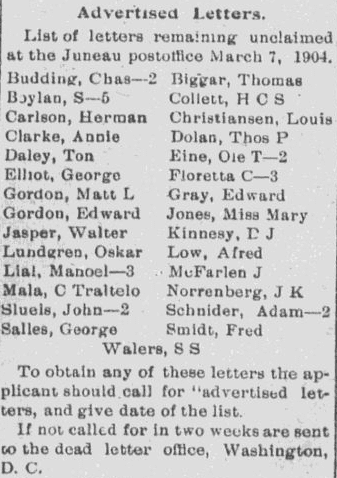
Most of us have heard at one time or another about the “dead letter office.” The Second Continental Congress established the position of inspector of dead letters, who would deal with undeliverable mail. Later, the first dead letter office in Washington, D.C. made its debut in 1825. Postmasters published lists of names in the newspaper of people who had letters waiting to be picked up, with warnings that unclaimed letters would be sent to the dead letter office.*
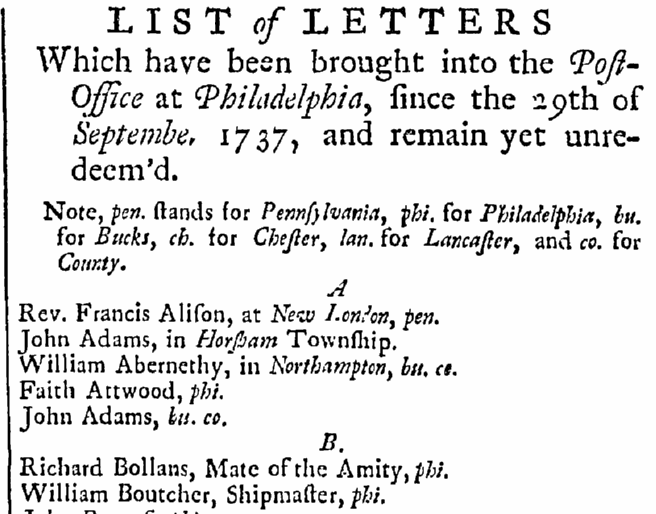
So where will you find your ancestor in the newspaper? Newspapers are a rich source of information and your ancestor could be mentioned in any type of article. But before you give up on finding that elusive ancestor, search for them in the 12 types of newspaper articles we outlined yesterday and today. Utilize tools provided in the GenealogyBank search engine to narrow and broaden your search. And remember to search on versions of your ancestor’s name, including initials.
Good luck in your search!
———————-
* Dead letter office gave rise to official seals. Linn’s Stamp. http://www.linns.com/en/insights/stamp-collecting-basics/2005/july/dead-letter-office-gave-rise-to-official-seals.html
Related Articles:
